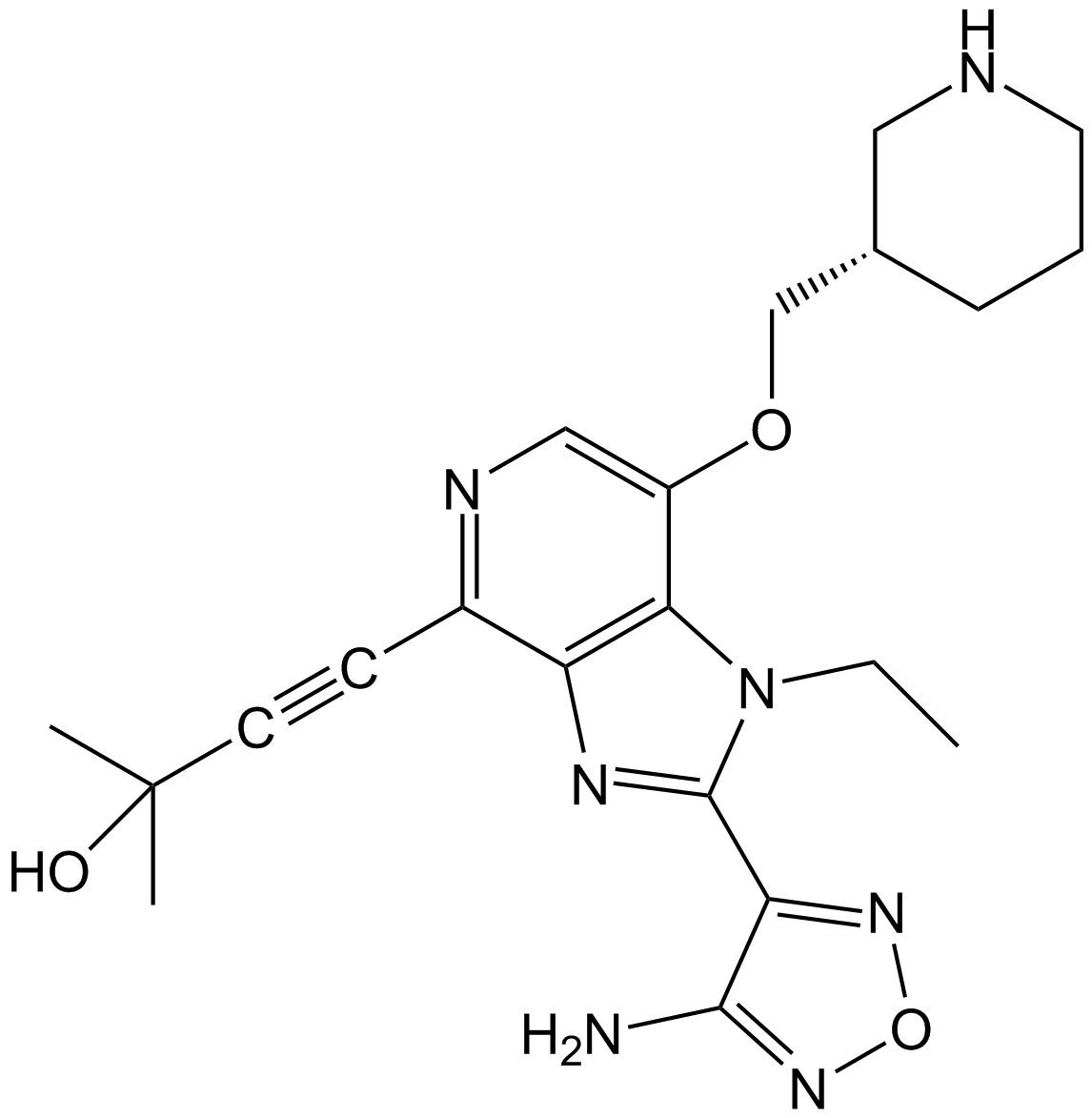GSK690693 |
| Catalog No.GC13696 |
GSK690693 is an ATP-competitive, low nanomolar inhibitor of Akt kinases with IC50 values of 2, 13, and 9 nM for Akt1, 2, and 3, respectively.
Products are for research use only. Not for human use. We do not sell to patients.

Cas No.: 937174-76-0
Sample solution is provided at 25 µL, 10mM.
GSK690693 is an ATP-competitive, low nanomolar inhibitor of Akt kinases with IC50 values of 2, 13, and 9 nM for Akt1, 2, and 3, respectively. The apparent Ki for full-length Akt1, 2, and 3 were determined as 1, 4, and 12 nM, respectively.
GSK690693 inhibited the phosphorylation of FKHR/FKHRL1, p70S6K, GSK3α/β, and PRAS40 in BT474 breast tumor cells in a dose-dependent manner [1]. The antiproliferative effect was selective for the malignant cells, as GSK690693 did not inhibit the proliferation of normal human CD4(+) peripheral T lymphocytes as well as mouse thymocytes. Phosphorylation of downstream substrates of AKT was reduced in both sensitive and insensitive cell lines on treatment with GSK690693[2].
GSK690693 was most effective in delaying tumor progression in Lck-MyrAkt2 mice expressing a membrane-bound, constitutively active form of Akt. Both tumors and primary cell cultures displayed downregulation of the Akt pathway, increased apoptosis, and primarily decreased cell proliferation[3].Repeated i.p. administration (once daily for 21 days) produced significant antitumor activity in mice bearing established SKOV-3 ovarian, LNCaP prostate, and BT474 and HCC-1954 breast carcinoma xenografts. Maximal inhibition of 58% to 75% was observed at the end of dosing period with 30 mg/kg/day dose. Daily administration of GSK690693 for 21 days was well-tolerated in mice with [1]. Treatment with antidiabetic agents does not significantly affect GSK690693-induced hyperglycemia in rodents. However, administration of GSK690693 in mice significantly reduces liver glycogen (approximately 90%), suggesting that GSK690693 may inhibit glycogen synthesis and/or activate glycogenolysis[3]. Interrupting treadmill running administrated mice with Akt inhibitor GSK690693 resulted in the blocked the effects of treadmill running to hippocampal neurogenesis and behavioral improvement in PTSD mice model[5]. AKT inhibitor GSK690693 can extend lifespan in Drosophila irrespective of start of the treatment from the beginning of life or the mid-life. Effect of GSK690693 for lifespan extension has been primarily related to the improvements in oxidative resistance, intestinal integrity and increased autophagy, but not in physical activity or starvation resistance[6]. EVI1 knockdown decreased cancer stem cell-like properties and improved irinotecan responses in both cell line and subcutaneous mouse models. Co-treatment with irinotecan and GSK690693 significantly reduced colon cancer cell survival and tumor progression rates[7].
References:
[1]. Rhodes N, Heerding DA, et,al. Characterization of an Akt kinase inhibitor with potent pharmacodynamic and antitumor activity. Cancer Res. 2008 Apr 1;68(7):2366-74. doi: 10.1158/0008-5472.CAN-07-5783. PMID: 18381444.
[2]. Levy DS, Kahana JA, et,al.AKT inhibitor, GSK690693, induces growth inhibition and apoptosis in acute lymphoblastic leukemia cell lines. Blood. 2009 Feb 19;113(8):1723-9. doi: 10.1182/blood-2008-02-137737. Epub 2008 Dec 8. PMID: 19064730.
[3]. Altomare DA, Zhang L, et,al.GSK690693 delays tumor onset and progression in genetically defined mouse models expressing activated Akt. Clin Cancer Res. 2010 Jan 15;16(2):486-96. doi: 10.1158/1078-0432.CCR-09-1026. PMID: 20075391; PMCID: PMC2807995.
[4]. Crouthamel MC, Kahana JA, et,al.Mechanism and management of AKT inhibitor-induced hyperglycemia. Clin Cancer Res. 2009 Jan 1;15(1):217-25. doi: 10.1158/1078-0432.CCR-08-1253. PMID: 19118049.
[5]. Sun L, Cui K, et,al.Akt dependent adult hippocampal neurogenesis regulates the behavioral improvement of treadmill running to mice model of post-traumatic stress disorder. Behav Brain Res. 2020 Feb 3;379:112375. doi: 10.1016/j.bbr.2019.112375. Epub 2019 Nov 20. PMID: 31759046.
[6]. Cheng X, Xie M, et,al.Inhibitor GSK690693 extends Drosophila lifespan via reduce AKT signaling pathway. Mech Ageing Dev. 2022 Mar;202:111633. doi: 10.1016/j.mad.2022.111633. Epub 2022 Jan 20. PMID: 35065134.
[7]. Pradeepa, Suresh V, et,al.AKT inhibition sensitizes EVI1 expressing colon cancer cells to irinotecan therapy by regulating the Akt/mTOR axis. Cell Oncol (Dordr). 2022 Aug;45(4):659-675. doi: 10.1007/s13402-022-00690-9. Epub 2022 Jul 14. PMID: 35834097.
Average Rating: 5 (Based on Reviews and 33 reference(s) in Google Scholar.)
GLPBIO products are for RESEARCH USE ONLY. Please make sure your review or question is research based.
Required fields are marked with *




















